Unit 2 Travelling Comic strip & Welcome to the unit(20页)课件牛津译林版八年级下册
文档属性
| 名称 | Unit 2 Travelling Comic strip & Welcome to the unit(20页)课件牛津译林版八年级下册 |
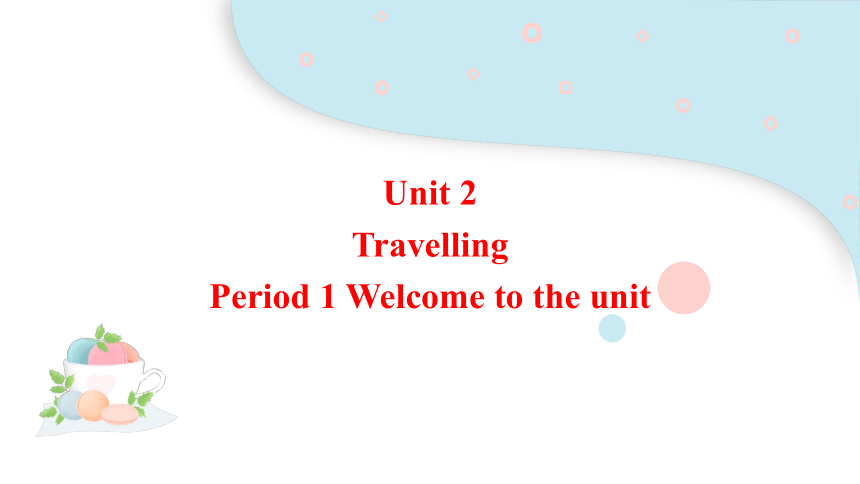
|
|
| 格式 | pptx | ||
| 文件大小 | 26.4MB | ||
| 资源类型 | 试卷 | ||
| 版本资源 | 牛津译林版 | ||
| 科目 | 英语 | ||
| 更新时间 | 2025-02-11 10:09:25 | ||
图片预览


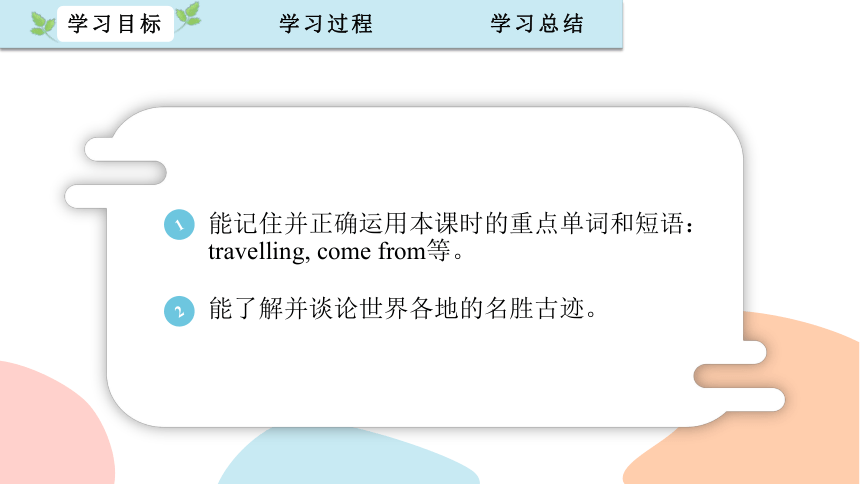
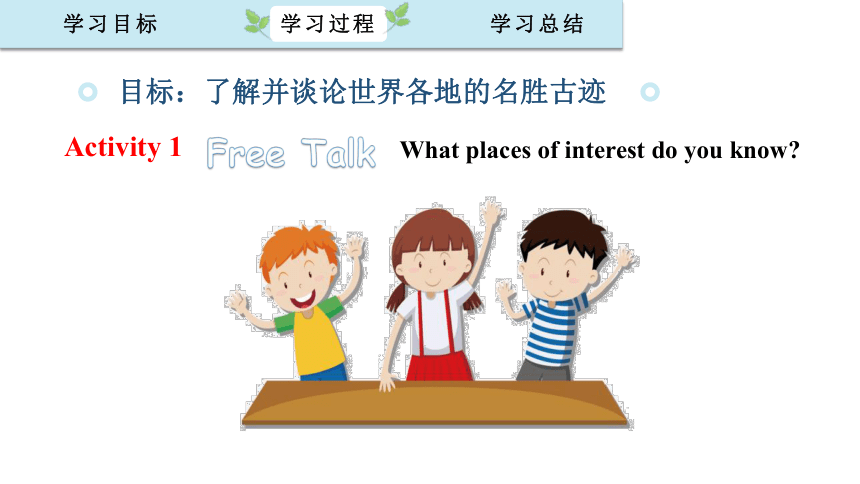
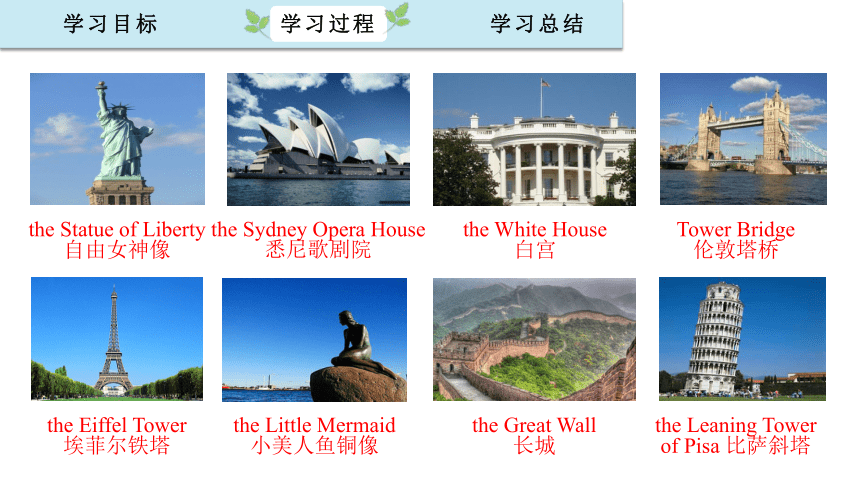



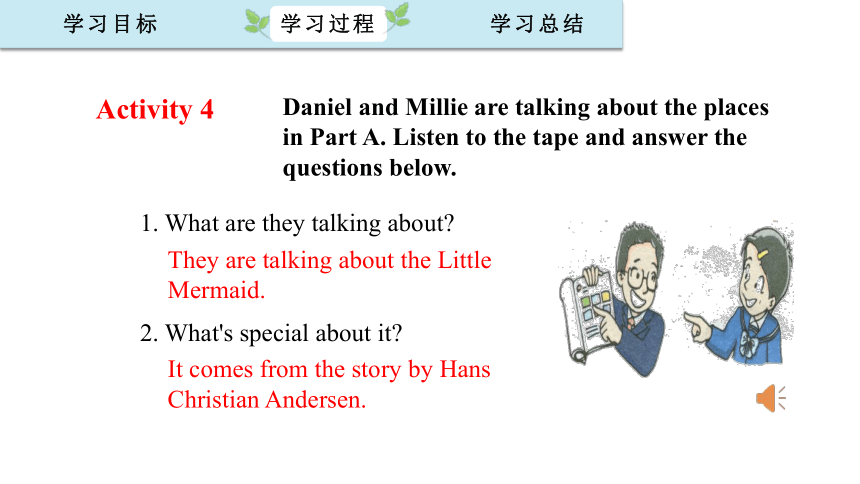
文档简介
(共20张PPT)
Unit 2
Travelling
Period 1 Welcome to the unit
Let's enjoy a video about places of interest around the world.
1
2
能记住并正确运用本课时的重点单词和短语:travelling, come from等。
能了解并谈论世界各地的名胜古迹。
目标:了解并谈论世界各地的名胜古迹
Activity 1
Free Talk
What places of interest do you know
the White House白宫
the Sydney Opera House悉尼歌剧院
the Eiffel Tower 埃菲尔铁塔
the Little Mermaid小美人鱼铜像
the Great Wall 长城
the Statue of Liberty 自由女神像
Tower Bridge伦敦塔桥
the Leaning Tower of Pisa 比萨斜塔
Daniel and Millie are looking at some pictures of places of interest from around the world. Help them write the correct names under the pictures.
the Great Wall the Leaning Tower of Pisa the Little Mermaid
the Statue of Liberty the Sydney Opera House Tower Bridge
1 2 3
the Little Mermaid
_________________
_________________
the Statue of Liberty
_________________
the Leaning Tower of Pisa
4 5 6
_________________
_________________
_________________
the Great Wall
the Sydney Opera House
Tower Bridge
Activity 2
Exercise
Group work
Work in groups and discuss more information about the places of interest in Part A. You can search on the Internet.
Activity 3
悉尼歌剧院(the Sydney Opera House),是一座供音乐、戏剧演出的建筑,坐落在悉尼。该建筑由丹表建筑师(architect)约恩·乌松(Jorn Utzon)设计,1959年动工,1973年竣工,被视为悉尼的标志。
长城(the Great Wall),又称万里长城,是中国古代的军事防御工事,是一道高大、坚固而且连绵不断的长垣,用以限隔敌骑的行动。
小美人鱼铜像(the Little Mermaid)是丹麦雕刻家(sculptor)爱德华·艾瑞克森(Edward Eriksen)根据安徒生童话《海的女儿》铸塑的,位于哥本哈根。
比萨斜塔(the Leaning Tower of Pisa)建造于1173年8月,是意大利比萨城大教堂(church)的独立式钟楼(Free-standing clock tower),位于意大利比萨城北面的奇迹广场上。
伦敦塔桥(Tower Bridge),是伦敦的象征,有"伦敦正门"之称。该桥始建于1886年,1894年6月30日对公众开放,将伦敦南北区连接成整体。
自由女神像(the Statue of liberty)是一个巨大的新古典主义(neoclassicism)雕塑(sculpture),现矗立在美国纽约海港(harbour)内一座被称为自由岛的小岛上。是法国人民送给美国人民的礼物。
Activity 4
Daniel and Millie are talking about the places in Part A. Listen to the tape and answer the questions below.
1. What are they talking about
They are talking about the Little Mermaid.
2. What's special about it
It comes from the story by Hans Christian Andersen.
Listen and read after the tape.
Have you ever been there
No, I haven't.
What's special about it
It comes from the story by Hans Christian Andersen.
Where is it
It's in Copenhagen, the capital of Denmark.
What's this, Millie
It's the Little Mermaid.
Have you ever been there
No, I haven't.
What's special about it
It comes from the story by Hans Christian Andersen.
Where is it
It's in Copenhagen, the capital of Denmark.
What's this, Millie
It's the Little Mermaid.
Role play
Work in pairs and act it out!
Pair work
Work in pairs and talk to your partner about different places. Use the conversation below as a model.
A: What's this, B
B: It's ….
A: Where is it
B: It's in ….
A: What's special about it
B: It ….
A: Have you ever been there
B: No, I haven't. / Yes, I have.
Activity 5
Free Talk
If you have a holiday, where would you like to go Why
Activity 6
Hobo and Eddie are talking about having a holiday. Listen to the tape and answer the questions below.
1. Where is Eddie going
2. Does Hobo want to go too
3. Does Eddie think that they will have a happy holiday
He is going to South Hill for his holiday.
Yes, he does. He wants to join Eddie.
No, he doesn't.
Listen and read after the tape, then find and explain some important language points in the dialogue in pairs.
Hey, Eddie. Where are you going
I'm going to South Hill for my holiday.
Really I've been there before. Can I join you
OK. Get ready!
What are you doing, Hobo
I'm getting all the things. I'm so excited!
I don't think it'll be a holiday for us.
Don't worry. I'll help you. Let's go.
Language points
1. Where are you going 你要去哪里
这是一个现在进行时态的句子,但表示的是将
来时的含义。在英语中,go, come, leave, start,
fly, arrive等表示“位置移动”的动词,它们的进
行时态往往表将来,含有意图、安排或打算的
含义。
e.g. I'm leaving for Canada the day after tomorrow.
我后天动身去加拿大。
2. Can I join you 我能加入你吗?
join多指参加组织、团体、党派等,后面也可以跟人,表示
和某人一起(参加活动)。
e.g. Have you joined the army 你参过军吗?
He joined the party in 2017. 他在2017年加入了党组织。
Let's go and join them, OK 我们加入他们吧?
拓展:join in和take part in 也表示参加“参加”
join in 指参加某项比赛、游戏、活动
e.g. Who will join in the 100-meter race 谁将参加100赛跑?
take part in多指参加一般的活动、运动、聚会、会议等等。
一般可以和 join in 互换。
e.g. Did Sam take part in the relay-race 山姆参加接力赛了吗?
3. I don't think it'll be a holiday for us.
我想对我们而言这不会是个什么假期了。
这是一个否定前移的句子,主句中的否定词实际否定的
是从句中的内容。当主句含有I think、I believe等词语时,
常用否定前移。这一语言现象说明英美人在表达个人观
点时较为含蓄。
e.g. I don't think your answer is right.
我认为你的答案不正确。
Role play
Work in pairs and act it out!
Hey, Eddie. Where are you going
I'm going to South Hill for my holiday.
Really I've been there before. Can I join you
OK. Get ready!
What are you doing, Hobo
I'm getting all my things. I'm so excited!
I don't think it'll be a holiday for us.
Don't worry. I'll help you. Let's go.
Summary:
What did you learn today
1. Say out different places of interest.
2. Talk about some language points.
3. Talk about places of interest.
Unit 2
Travelling
Period 1 Welcome to the unit
Let's enjoy a video about places of interest around the world.
1
2
能记住并正确运用本课时的重点单词和短语:travelling, come from等。
能了解并谈论世界各地的名胜古迹。
目标:了解并谈论世界各地的名胜古迹
Activity 1
Free Talk
What places of interest do you know
the White House白宫
the Sydney Opera House悉尼歌剧院
the Eiffel Tower 埃菲尔铁塔
the Little Mermaid小美人鱼铜像
the Great Wall 长城
the Statue of Liberty 自由女神像
Tower Bridge伦敦塔桥
the Leaning Tower of Pisa 比萨斜塔
Daniel and Millie are looking at some pictures of places of interest from around the world. Help them write the correct names under the pictures.
the Great Wall the Leaning Tower of Pisa the Little Mermaid
the Statue of Liberty the Sydney Opera House Tower Bridge
1 2 3
the Little Mermaid
_________________
_________________
the Statue of Liberty
_________________
the Leaning Tower of Pisa
4 5 6
_________________
_________________
_________________
the Great Wall
the Sydney Opera House
Tower Bridge
Activity 2
Exercise
Group work
Work in groups and discuss more information about the places of interest in Part A. You can search on the Internet.
Activity 3
悉尼歌剧院(the Sydney Opera House),是一座供音乐、戏剧演出的建筑,坐落在悉尼。该建筑由丹表建筑师(architect)约恩·乌松(Jorn Utzon)设计,1959年动工,1973年竣工,被视为悉尼的标志。
长城(the Great Wall),又称万里长城,是中国古代的军事防御工事,是一道高大、坚固而且连绵不断的长垣,用以限隔敌骑的行动。
小美人鱼铜像(the Little Mermaid)是丹麦雕刻家(sculptor)爱德华·艾瑞克森(Edward Eriksen)根据安徒生童话《海的女儿》铸塑的,位于哥本哈根。
比萨斜塔(the Leaning Tower of Pisa)建造于1173年8月,是意大利比萨城大教堂(church)的独立式钟楼(Free-standing clock tower),位于意大利比萨城北面的奇迹广场上。
伦敦塔桥(Tower Bridge),是伦敦的象征,有"伦敦正门"之称。该桥始建于1886年,1894年6月30日对公众开放,将伦敦南北区连接成整体。
自由女神像(the Statue of liberty)是一个巨大的新古典主义(neoclassicism)雕塑(sculpture),现矗立在美国纽约海港(harbour)内一座被称为自由岛的小岛上。是法国人民送给美国人民的礼物。
Activity 4
Daniel and Millie are talking about the places in Part A. Listen to the tape and answer the questions below.
1. What are they talking about
They are talking about the Little Mermaid.
2. What's special about it
It comes from the story by Hans Christian Andersen.
Listen and read after the tape.
Have you ever been there
No, I haven't.
What's special about it
It comes from the story by Hans Christian Andersen.
Where is it
It's in Copenhagen, the capital of Denmark.
What's this, Millie
It's the Little Mermaid.
Have you ever been there
No, I haven't.
What's special about it
It comes from the story by Hans Christian Andersen.
Where is it
It's in Copenhagen, the capital of Denmark.
What's this, Millie
It's the Little Mermaid.
Role play
Work in pairs and act it out!
Pair work
Work in pairs and talk to your partner about different places. Use the conversation below as a model.
A: What's this, B
B: It's ….
A: Where is it
B: It's in ….
A: What's special about it
B: It ….
A: Have you ever been there
B: No, I haven't. / Yes, I have.
Activity 5
Free Talk
If you have a holiday, where would you like to go Why
Activity 6
Hobo and Eddie are talking about having a holiday. Listen to the tape and answer the questions below.
1. Where is Eddie going
2. Does Hobo want to go too
3. Does Eddie think that they will have a happy holiday
He is going to South Hill for his holiday.
Yes, he does. He wants to join Eddie.
No, he doesn't.
Listen and read after the tape, then find and explain some important language points in the dialogue in pairs.
Hey, Eddie. Where are you going
I'm going to South Hill for my holiday.
Really I've been there before. Can I join you
OK. Get ready!
What are you doing, Hobo
I'm getting all the things. I'm so excited!
I don't think it'll be a holiday for us.
Don't worry. I'll help you. Let's go.
Language points
1. Where are you going 你要去哪里
这是一个现在进行时态的句子,但表示的是将
来时的含义。在英语中,go, come, leave, start,
fly, arrive等表示“位置移动”的动词,它们的进
行时态往往表将来,含有意图、安排或打算的
含义。
e.g. I'm leaving for Canada the day after tomorrow.
我后天动身去加拿大。
2. Can I join you 我能加入你吗?
join多指参加组织、团体、党派等,后面也可以跟人,表示
和某人一起(参加活动)。
e.g. Have you joined the army 你参过军吗?
He joined the party in 2017. 他在2017年加入了党组织。
Let's go and join them, OK 我们加入他们吧?
拓展:join in和take part in 也表示参加“参加”
join in 指参加某项比赛、游戏、活动
e.g. Who will join in the 100-meter race 谁将参加100赛跑?
take part in多指参加一般的活动、运动、聚会、会议等等。
一般可以和 join in 互换。
e.g. Did Sam take part in the relay-race 山姆参加接力赛了吗?
3. I don't think it'll be a holiday for us.
我想对我们而言这不会是个什么假期了。
这是一个否定前移的句子,主句中的否定词实际否定的
是从句中的内容。当主句含有I think、I believe等词语时,
常用否定前移。这一语言现象说明英美人在表达个人观
点时较为含蓄。
e.g. I don't think your answer is right.
我认为你的答案不正确。
Role play
Work in pairs and act it out!
Hey, Eddie. Where are you going
I'm going to South Hill for my holiday.
Really I've been there before. Can I join you
OK. Get ready!
What are you doing, Hobo
I'm getting all my things. I'm so excited!
I don't think it'll be a holiday for us.
Don't worry. I'll help you. Let's go.
Summary:
What did you learn today
1. Say out different places of interest.
2. Talk about some language points.
3. Talk about places of interest.
